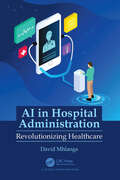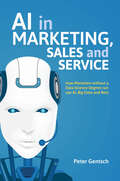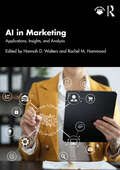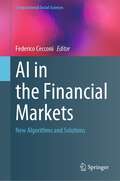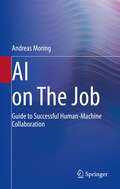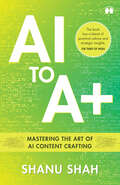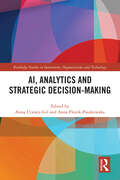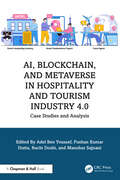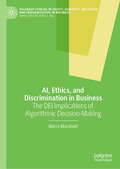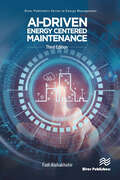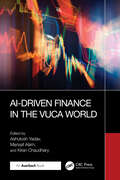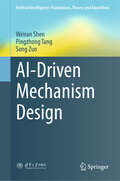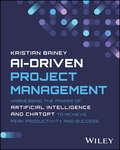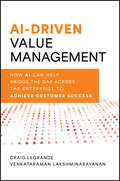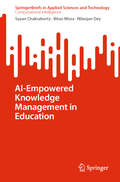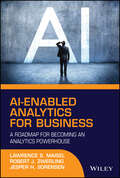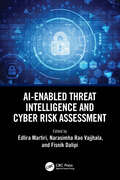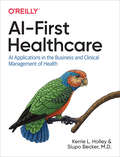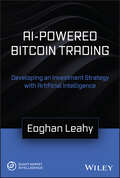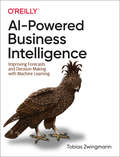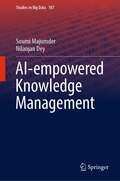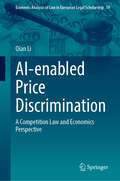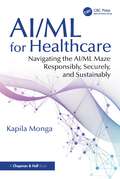- Table View
- List View
AI in Hospital Administration: Revolutionizing Healthcare
by David MhlangaAI in Hospital Administration: Revolutionizing Healthcare is a groundbreaking book that explores the transformative potential of artificial intelligence (AI) in hospital administration and its impact on revolutionizing healthcare. This book draws on existing academic literature and interdisciplinary research to provide a comprehensive overview of cutting-edge AI technologies and their applications in hospital administration. The book begins by highlighting the basics of AI. It moves to the challenges hospital administrators face, such as long wait times, inefficient scheduling, inaccurate forecasting, and suboptimal resource allocation. It emphasizes the need for effective management and decision-making strategies to optimize patient outcomes while ensuring efficient resource utilization. While AI has seen significant advancements in areas like medical imaging and clinical decision support systems, its role in hospital administration remains relatively understudied. This book aims to fill this gap by delving into the complexities of managing patient flow, optimizing resource allocation, ensuring effective staff scheduling, and implementing data-driven decision-making processes. It explores various AI-powered solutions, including machine learning, natural language processing, and predictive analytics, and their potential to alleviate these challenges. It also covers ethical considerations and potential barriers to AI adoption in healthcare, such as privacy concerns, data security, and the human-machine interface. The book includes real-world case studies and examples of successful AI implementations in hospital administration to provide practical insights. Doing so equips healthcare professionals, administrators, policymakers, and researchers with the knowledge and tools to leverage AI effectively, foster innovation, and drive positive change in healthcare organizations. In short, AI in Hospital Administration: Revolutionizing Healthcare addresses the gap in academic literature surrounding the role of AI in hospital administration. It comprehensively understands this domain's challenges, limitations, and opportunities, stimulating further research and promoting informed decision-making. The book envisions a future where AI plays a central role in transforming healthcare administration for the better.
AI in Marketing, Sales and Service: How Marketers without a Data Science Degree can use AI, Big Data and Bots
by Peter GentschAI and Algorithmics have already optimized and automated production and logistics processes. Now it is time to unleash AI on the administrative, planning and even creative procedures in marketing, sales and management.This book provides an easy-to-understand guide to assessing the value and potential of AI and Algorithmics. It systematically draws together the technologies and methods of AI with clear business scenarios on an entrepreneurial level. With interviews and case studies from those cutting edge businesses and executives who are already leading the way, this book shows you: how customer and market potential can be automatically identified and profiled; how media planning can be intelligently automated and optimized with AI and Big Data; how (chat)bots and digital assistants can make communication between companies and consumers more efficient and smarter; how you can optimize Customer Journeys based on Algorithmics and AI; and how to conduct market research in more efficient and smarter way. A decade from now, all businesses will be AI businesses – Gentsch shows you how to make sure yours makes that transition better than your competitors.
AI in Marketing: Applications, Insights, and Analysis
by Hannah D. Walters Rachel M. HammondAI in Marketing equips students with the knowledge to understand the impact of Artificial Intelligence (AI) on marketing strategies, processes, and activities, empowering them to navigate the AI-driven marketing landscape confidently.Divided into four parts, it provides a comprehensive exploration of AI's transformative role in marketing. The first part lays the groundwork, offering foundational insights into the intersection of AI and marketing. Part II explores the various applications of AI in marketing, and the tools marketers use to optimize their processes and deliver enhanced customer experiences. The third part focuses on leveraging AI for consumer insights, enabling marketers to craft data-driven strategies. The final part examines ethical considerations and the pedagogical integration of AI into marketing education. Each chapter includes real-world examples, exercises, discussion questions, key terms, and AI resources, empowering students to develop practical skills and industry-relevant knowledge.Students studying in advanced undergraduate and postgraduate marketing courses will benefit greatly from this comprehensive textbook, preparing them for a future workplace that requires them to know how to use AI effectively, ethically, and responsibly.The book is fully supported by online resources, including an instructor manual and customizable PowerPoint slides.
AI in the Financial Markets: New Algorithms and Solutions (Computational Social Sciences)
by Federico CecconiThis book is divided into two parts, the first of which describes AI as we know it today, in particular the Fintech-related applications. In turn, the second part explores AI models in financial markets: both regarding applications that are already available (e.g. the blockchain supply chain, learning through big data, understanding natural language, or the valuation of complex bonds) and more futuristic solutions (e.g. models based on artificial agents that interact by buying and selling stocks within simulated worlds).The effects of the COVID-19 pandemic are starting to show their financial effects: more companies in a liquidity crisis; more unstable debt positions; and more loans from international institutions for states and large companies. At the same time, we are witnessing a growth of AI technologies in all fields, from the production of goods and services, to the management of socio-economic infrastructures: in medicine, communications, education, and security. The question then becomes: could we imagine integrating AI technologies into the financial markets, in order to improve their performance? And not just limited to using AI to improve performance in high-frequency trading or in the study of trends. Could we imagine AI technologies that make financial markets safer, more stable, and more comprehensible? The book explores these questions, pursuing an approach closely linked to real-world applications.The book is intended for three main categories of readers: (1) management-level employees of companies operating in the financial markets, banks, insurance operators, portfolio managers, brokers, risk assessors, investment managers, and debt managers; (2) policymakers and regulators for financial markets, from government technicians to politicians; and (3) readers curious about technology, both for professional and private purposes, as well as those involved in innovation and research in the private and public spheres.
AI on The Job: Guide to Successful Human-Machine Collaboration
by Andreas MoringThis book is a practical guide to using artificial intelligence with motivated employees in companies and organizations. You will learn what the prerequisites are for people to look forward to productive collaboration with "intelligent machines". Because this is the only way to leverage the full potential of AI. To this end, you will receive an overview of how and where AI can be used in companies and how to identify the right areas of application for AI in your company. The main issue here is the following: which tasks will be taken over by AI in the future and which should continue to be performed by employees. These decisions change processes and tasks and require practical change management and motivation. In this book, you will learn how to motivate and inspire people for these new tasks, so that the steps towards using AI in the work environment can succeed in the best possible way. About the Author: Prof. Dr. Andreas Moring is Professor of Digital Business, Innovation & AI at the International School of Management. He is founder and director of the JuS.TECH Institute for AI and Sustainability, co-founder of the WeGoFive initiative for productive human-AI cooperation and topic sponsor for human-AI cooperation at the Artificial Intelligence Center ARIC in Hamburg. This book is a translation of the original German 1st edition KI im Job by Andreas Moring, published by Springer-Verlag GmbH Germany, part of Springer Nature in 2021. The translation was done with the help of artificial intelligence (machine translation by the service DeepL.com). A subsequent human revision was done primarily in terms of content, so that the book will read stylistically differently from a conventional translation. Springer Nature works continuously to further the development of tools for the production of books and on the related technologies to support the authors.
AI to A+
by Shanu ShahUnlock the true power of your AI-generated content with AI to A+. Packed with practical strategies and proven techniques, this book equips you with the tools to elevate your writing to new heights. Each chapter presents a carefully crafted rubric designed to transform your drafts into polished, compelling narratives.Whether you are a seasoned content creator or just beginning to explore the world of generative AI, this guide offers actionable insights to make your work stand out. With a handy checklist and key takeaways included, applying these principles becomes a seamless part of your writing routine.More than just a manual, AI to A+ is your strategic partner in mastering the art of AI content editing. So, start your journey towards content excellence today and discover how to make every word count.
AI, Analytics and Strategic Decision-Making (Routledge Studies in Innovation, Organizations and Technology)
by Ujwary-Gil, Edited by Anna Anna Florek-PaszkowskaAI, Analytics and Strategic Decision-Making is an insightful exploration into the transformative power of artificial intelligence and advanced analytics in business and policy contexts. This volume provides a unique blend of theoretical knowledge and practical applications, showcasing how AI and analytics are reshaping decision-making processes across multiple domains.From predicting high-growth firms using Random Forests to leveraging Large Language Models for process mining, this book offers an extensive look at the latest innovations in AI and their strategic implications. It explores diverse topics, including the role of knowledge management in Industry 4.0, AI-powered decision-making tools for individuals, and public policy-making through Internet Public Opinion Analysis. Each chapter provides a nuanced perspective on how AI and analytics tools—ranging from Social Network Analysis to agent-based modeling—can tackle real-world challenges, such as climate change, resource allocation, and productivity enhancement.AI, Analytics and Strategic Decision-Making will inspire entrepreneurs, policymakers, academics, and business strategists to think critically about the power of data-driven insights and AI technologies. This comprehensive resource dives into how innovative tools can foster informed decision-making, drive efficiency, and pave the way for strategic success in an increasingly complex world.
AI, Blockchain, and Metaverse in Hospitality and Tourism Industry 4.0: Case Studies and Analysis
by Pushan Kumar Dutta Adel Ben Youssef Ruchi Doshi Manohar SajnaniThe book offers a critical exploration of the integration of AI, blockchain, and metaverse technology in the hospitality and tourism industry to investigate the potential of these technologies in revolutionizing the industry. This comprehensive work studies, with practical examples, how cutting-edge technologies of Industry 4.0 are transforming luxury industry into a high-touch, hyper-personalized metaverse. It explains how these technologies can be used to improve customer experience and operational efficiency in areas such as guest interaction, supply chain management, payment processing, and virtual stores. The book also discusses the conditions that can promote sustainable development in the hospitality industry using Industry 4.0 technologies. Provides an innovative perspective by blending high-tech trends like AI, blockchain, and metaverse with traditional wellness practices Emphasis on ethical considerations and potential risks associated with the use of these technologies, providing a balanced perspective on their impact Includes case studies and practical examples on how businesses can use AI, blockchain, and the metaverse to improve customer experiences and operational efficiency Explores how the hospitality industry can embrace Industry 4.0 technologies to improve its operations, enhance customer experiences, and contribute to sustainable development Provides a roadmap for companies looking to implement these technologies, highlighting potential benefits and pitfalls of each approach This reference book is for scholars and professionals in computer science who are interested in studying the effect of AI, blockchain, and metaverse in hospitality and tourism industry.
AI, Ethics, and Discrimination in Business: The DEI Implications of Algorithmic Decision-Making (Palgrave Studies in Equity, Diversity, Inclusion, and Indigenization in Business)
by Marco MarabelliThis book takes a historical approach to explore data, algorithms, their use in practice through applications of AI in various settings, and all of the surrounding ethical and DEI implications. Summarizing our current knowledge and highlighting gaps, it offers original examples from empirical research in various settings, such as healthcare, social media, and the GIG economy.The author investigates how systems relying on a binary structure (machines) work in systems that are instead analogic (societies). Further, he examines how underrepresented populations, who have been historically penalized by technologies, can play an active role in the design of automated systems, with a specific focus on the US legal and social system.One issue is that main tasks of machines concern classification, which, while efficient for speeding up decision-making processes, are inherently biased. Ultimately, this work advocates for ethical design and responsible implementation and deployment of technology in organizations and society through through government-sponsored social justice, in contrast with free market policies.This interdisciplinary text contributes to the timely and relevant debate on algorithmic fairness, biases, and potential discriminations. It will appeal to researchers in business ethics and information systems while building on theories from anthropology, psychology, sociology, management, marketing, and economics.
AI-Driven Energy Centered Maintenance (River Publishers Series in Energy Management)
by Fadi AlshakhshirThis third edition provides a comprehensive update and expansion on the principles and practices of Energy-Centered Maintenance (ECM). It combines advanced concepts with actionable strategies to enhance equipment energy efficiency, reliability, and availability. By integrating cutting-edge developments in artificial intelligence, machine learning, and predictive maintenance, the book offers a modernized approach to facility management that aligns with digital transformation trends. Designed as a self-study guide and reference for energy engineers, facility managers, and maintenance professionals, this edition provides invaluable knowledge on data-driven and AI-driven maintenance strategies, energy performance optimization, and the integration of smart technologies into maintenance planning. Through practical insights, case studies, and real-world applications, it emphasizes sustainability, operational excellence, and cost-efficiency. Tailored for engineers, facility managers, students, and decision-makers, this edition equips readers with the tools and knowledge needed to implement ECM effectively in modern facilities. It bridges theoretical foundations with real-world applications, demonstrating ECM’s critical role in reducing energy consumption, enhancing equipment performance, and supporting sustainable, AI-driven facility management practices.
AI-Driven Finance in the VUCA World
by Mansaf Alam Kiran Chaudhary Ashutosh YadavIn today’s world, characterized by volatility, uncertainty, complexity, and ambiguity (VUCA), traditional finance is no longer sufficient to meet the challenges of fast-paced and interconnected global markets. To thrive in this dynamic environment, financial institutions, professionals, and policymakers are increasingly turning to AI. AI-Driven Finance in the VUCA World explores how AI is becoming ever more critical in the financial industry.This book looks at the impact of AI on investment strategies. AI-powered algorithms exhibit the capacity to scrutinize extensive datasets to unveil masked patterns and investment opportunities. From quantitative trading algorithms adept at capitalizing on market inefficiencies to robot-advisors offering individualized investment counsel, AI profoundly reconfigures the investment landscape. In a VUCA world, risk management is paramount, and regulatory scrutiny is tighter than ever. AI’s ability to assess risks in real time is critical in identifying anomalies and predicting potential crises. The book examines how AI enhances risk assessment, fraud detection, and compliance to provide institutions with a proactive edge in safeguarding operations and assets. This text also looks at the following: AI-driven chatbots, virtual assistants, and recommendation engines that revolutionize customer interactions, enhance engagement, and improve retention rates The ethical challenges surrounding AI in finance, including bias in algorithms, data privacy, and the responsible use of AI Case studies on how AI can solve specific industry challenges and drive innovation The future of finance is intertwined with AI, and this book looks to this future by discussing emerging trends and possibilities. It explores the potential of quantum computing in finance, the role of AI in sustainability and ESG investing, and the implications of AI-powered regulatory technologies. Seeking to provide valuable insights for financial professionals, the book is equally valuable to researchers, policymakers, and anyone interested in the future of finance. It bridges the gap between theory and practice, offering actionable insights that can be immediately applied in the real world.
AI-Driven Mechanism Design (Artificial Intelligence: Foundations, Theory, and Algorithms)
by Weiran Shen Pingzhong Tang Song ZuoDue to its huge success in industry, mechanism design has been one of the central research topics at the interface of economics and computer science. However, despite decades of effort, there are still numerous challenges, in terms of both theory and applications. These include the problem of how to design mechanisms for selling multiple items, dynamic auctions, and balancing multiple objectives, given the huge design space and buyer strategy space; and the fact that in practice, the most widely applied auction format (the generalized second price auction) is neither truthful nor optimal. Furthermore, many theoretical results are based upon unrealistic assumptions that do not hold in real applications. This book presents the AI-driven mechanism design framework, which aims to provide an alternative way of dealing with these problems. The framework features two abstract models that interact with each other: the agent model and the mechanism model. By combining AI techniques with mechanism design theory, it solves problems that cannot be solved using tools from either domain alone. For example, it can reduce the mechanism space significantly, build more realistic buyer models, and better balance different objectives. The book focuses on several aspects of mechanism design and demonstrates that the framework is useful in both theoretical analysis and practical applications.
AI-Driven Project Management: Harnessing the Power of Artificial Intelligence and ChatGPT to Achieve Peak Productivity and Success
by Kristian BaineyAccelerate your next project with artificial intelligence and ChatGPT In AI-Driven Project Management: Harnessing the Power of Artificial Intelligence and ChatGPT to Achieve Peak Productivity and Success, veteran IT and project management advisor Kristian Bainey delivers an insightful collection of strategies for automating the administration and management of projects. In the book, the author focuses on four key areas where project leaders can achieve improved results with AI's data-centric capabilities: minimizing surprises, minimizing bias, increasing standards, and accelerating decision making. You'll also find: Primers on the role of AI and ChatGPT in Agile, Hybrid, and Predictive approaches to project management How to accurately forecast a project with ChatGPT Techniques for crafting impactful AI strategy using AI project management principles Perfect for managers, executives, and business leaders everywhere, AI-Driven Project Management is also a must-read for project management professionals, tech professionals and enthusiasts, and anyone else interested in the intersection of artificial intelligence, machine learning, and project management.
AI-Driven Value Management: How AI Can Help Bridge the Gap Across the Enterprise to Achieve Customer Success
by Craig LeGrande Venky LakshminarayananUnlock the power of generative AI to transform your enterprise B2B sales and marketing strategies In AI-Driven Value Management: How AI Can Help Bridge the Gap Across the Enterprise to Achieve Customer Success, authors Craig LeGrande and Venky Lakshminarayanan reveal how artificial intelligence can revolutionize B2B value management. This book lays out a first-ever strategic blueprint for cost-effectively scaling value management programs. Value management is the art and science of orchestrating all the business functions in your company to envision and create exceptional value for your customers – and in the process enhance your pipeline, revenue and renewals. It's designed for business leaders who are looking to harness AI to gain a competitive edge and boost pipeline, revenue and expansions, effectively solving the problem of expensive scaling in business-to-business sales and marketing. Dive into the core of AI-empowered Value Management (AI-VM) through a detailed exploration of a comprehensive AI-driven value management blueprint. This guide uses real-world success stories and cutting edge AI technology solutions to illustrate how businesses can combine people, processes, and technology to execute value management at scale, enhancing efficiency and effectiveness. In this book, you'll: Learn from the successes and strategies of leading companies like Salesforce, ServiceNow, and Amazon Web Services Discover the AI-VM Blueprint, an integrated framework that lays out strategic, operational, and technological guidelines for deploying AI-driven value management Equip your team with actionable insights and tools to innovate and implement AI in your sales, marketing and customer success strategies effectively AI-Driven Value Management is essential reading for B2B professionals eager to leverage AI for business growth. If you are a business leader, manager, or professional aiming to integrate AI into your value management practices, this book will provide you with the knowledge and tools you need.
AI-Empowered Knowledge Management in Education (SpringerBriefs in Applied Sciences and Technology)
by Nilanjan Dey Sayan Chakraborty Bitan MisraThis book explains basic ideas behind several methods used in artificial intelligence-based knowledge management techniques. It also shows how these techniques are applied in practical contexts in different education sectors. The book discusses AI-based knowledge management applications, AI-empowered knowledge management in primary and higher education, and technical and ethical challenges and opportunities.
AI-Enabled Analytics for Business: A Roadmap for Becoming an Analytics Powerhouse
by Lawrence S. Maisel Robert J. Zwerling Jesper H. SorensenWe are entering the era of digital transformation where human and artificial intelligence (AI) work hand in hand to achieve data driven performance. Today, more than ever, businesses are expected to possess the talent, tools, processes, and capabilities to enable their organizations to implement and utilize continuous analysis of past business performance and events to gain forward-looking insight to drive business decisions and actions. AI-Enabled Analytics in Business is your Roadmap to meet this essential business capability. To ensure we can plan for the future vs react to the future when it arrives, we need to develop and deploy a toolbox of tools, techniques, and effective processes to reveal forward-looking unbiased insights that help us understand significant patterns, relationships, and trends. This book promotes clarity to enable you to make better decisions from insights about the future. Learn how advanced analytics ensures that your people have the right information at the right time to gain critical insights and performance opportunities Empower better, smarter decision making by implementing AI-enabled analytics decision support tools Uncover patterns and insights in data, and discover facts about your business that will unlock greater performance Gain inspiration from practical examples and use cases showing how to move your business toward AI-Enabled decision making AI-Enabled Analytics in Business is a must-have practical resource for directors, officers, and executives across various functional disciplines who seek increased business performance and valuation.
AI-Enabled Threat Intelligence and Cyber Risk Assessment
by Narasimha Rao Vajjhala Edlira Martiri Fisnik DalipiAI-Enabled Threat Intelligence and Cyber Risk Assessment delves into the transformative potential of artificial intelligence (AI) in revolutionizing cybersecurity, offering a comprehensive exploration of current trends, challenges, and future possibilities in mitigating cyber risks. This book brings together cutting-edge research and practical insights from an international team of experts to examine how AI technologies are reshaping threat intelligence, safeguarding data, and driving digital transformation across industries. The book covers a broad spectrum of topics, including AI-driven fraud prevention in digital marketing, strategies for building customer trust through data privacy, and the role of AI in enhancing educational and healthcare cybersecurity systems. Through in-depth analyses and case studies, this book highlights the barriers to AI adoption, the legal and ethical considerations, and the development of resilient cybersecurity frameworks.Special emphasis is given to regional insights, such as the digital transformation of Kazakh businesses and the integration of AI in diverse global contexts, offering valuable lessons for researchers, policymakers, and practitioners. From safeguarding patient data in healthcare to addressing automated threats in digital marketing, this book provides actionable strategies and emerging perspectives on the evolving landscape of AI in risk management. Designed for academics, professionals, and students, AI-Enabled Threat Intelligence and Cyber Risk Assessment serves as an essential resource for understanding the intersection of AI, cybersecurity, and risk assessment. With contributions from leading researchers across various disciplines, this book underscores the critical role of AI in building resilient, ethical, and innovative solutions to today’s most pressing cybersecurity challenges.
AI-First Healthcare
by Kerrie L. Holley Siupo BeckerAI is poised to transform every aspect of healthcare, including the way we manage personal health, from customer experience and clinical care to healthcare cost reductions. This practical book is one of the first to describe present and future use cases where AI can help solve pernicious healthcare problems.Kerrie Holley and Siupo Becker provide guidance to help informatics and healthcare leadership create AI strategy and implementation plans for healthcare. With this book, business stakeholders and practitioners will be able to build knowledge, a roadmap, and the confidence to support AIin their organizations—without getting into the weeds of algorithms or open source frameworks.Cowritten by an AI technologist and a medical doctor who leverages AI to solve healthcare’s most difficult challenges, this book covers:The myths and realities of AI, now and in the futureHuman-centered AI: what it is and how to make it possibleUsing various AI technologies to go beyond precision medicineHow to deliver patient care using the IoT and ambient computing with AIHow AI can help reduce waste in healthcareAI strategy and how to identify high-priority AI application
AI-ML for Decision and Risk Analysis: Challenges and Opportunities for Normative Decision Theory (International Series in Operations Research & Management Science #345)
by Louis Anthony Cox Jr.This book explains and illustrates recent developments and advances in decision-making and risk analysis. It demonstrates how artificial intelligence (AI) and machine learning (ML) have not only benefitted from classical decision analysis concepts such as expected utility maximization but have also contributed to making normative decision theory more useful by forcing it to confront realistic complexities. These include skill acquisition, uncertain and time-consuming implementation of intended actions, open-world uncertainties about what might happen next and what consequences actions can have, and learning to cope effectively with uncertain and changing environments. The result is a more robust and implementable technology for AI/ML-assisted decision-making.The book is intended to inform a wide audience in related applied areas and to provide a fun and stimulating resource for students, researchers, and academics in data science and AI-ML, decision analysis, and other closely linked academic fields. It will also appeal to managers, analysts, decision-makers, and policymakers in financial, health and safety, environmental, business, engineering, and security risk management.
AI-Powered Bitcoin Trading: Developing an Investment Strategy with Artificial Intelligence
by Eoghan LeahySurvive and thrive amongst the professional traders using sophisticated cryptocurrency analysis and trading techniques The purpose of this book is to provide a concise yet comprehensive background of some effective methods for analyzing markets and creating fully automated AI-optimized trading systems. The book outlines some easy-to-replicate yet highly effective quant trading techniques that can be used for analyzing asset prices and then apply them to Bitcoin prices, showing how to generate actionable insights from data that can be used to create fully automated trading signals and systems. Big data analytics can be enhanced with artificial intelligence techniques. Back testing and optimization methods are presented with a special emphasis placed on the use of distributed genetic algorithms for parameter optimization. Finally, a case study of a fully automated trend-following trading strategy that leverages artificial intelligence is presented. Bitcoin AlphaBot™ combines human insight with AI-driven optimization to build profit table trend trading strategies.
AI-Powered Business Intelligence: Improving Forecasts and Decision Making with Machine Learning
by Tobias ZwingmannUse business intelligence to power corporate growth, increase efficiency, and improve corporate decision making. With this practical book featuring hands-on examples in Power BI with basic Python and R code, you'll explore the most relevant AI use cases for BI, including improved forecasting, automated classification, and AI-powered recommendations. And you'll learn how to draw insights from unstructured data sources like text, document, and image files.Author Tobias Zwingmann helps BI professionals, business analysts, and data analytics understand high-impact areas of artificial intelligence. You'll learn how to leverage popular AI-as-a-service and AutoML platforms to ship enterprise-grade proofs of concept without the help of software engineers or data scientists.Learn how AI can generate business impact in BI environmentsUse AutoML for automated classification and improved forecastingImplement recommendation services to support decision-makingDraw insights from text data at scale with NLP servicesExtract information from documents and images with computer vision servicesBuild interactive user frontends for AI-powered dashboard prototypesImplement an end-to-end case study for building an AI-powered customer analytics dashboard
AI-Powered Sustainable Business (Palgrave Studies in Moral and Mindful Approaches to Leadership and Business)
by Maria Alejandra Gonzalez-Perez Mahmoud Mohieldin Mohamed ZahranThis book explores the complex interplay between AI and corporate-driven sustainable development. Merging theoretical insights with practical applications, it engages debates on the ethical use of AI in sustainable development and corporate responsibility while examining how AI facilitates sustainable practices and presents complex dilemmas, particularly in balancing economic, social, and environmental sustainability. The narrative is enriched by a comprehensive review of academic studies, analyzing how established and sustainability-rooted companies approach these paradoxes differently. The authors critically assess how AI and corporate actions intertwine with regional efforts to combat grand humanity challenges, such as climate change and poverty, highlighting the need for transformative strategies and governance modes that can propel positive corporate contributions to sustainability. Through a mix of scholarly insights and expert viewpoints, this volume invites readers to explore the multifaceted relationship between AI, corporate sustainability, and global environmental goals. It is an essential read for business leaders, policymakers, and anyone invested in shaping a sustainable future in an AI-driven world.
AI-empowered Knowledge Management (Studies in Big Data #107)
by Nilanjan Dey Soumi MajumderThis book is focused on AI-empowered knowledge management to improve processes, implementation of technology for providing easy access to knowledge and the impact of knowledge management to promote the platform for generation of new knowledge through continuous learning. The book discusses process of knowledge management which includes entirety of the creation, distribution, and maintenance of knowledge to achieve organizational objectives. It also covers knowledge management tools which enable and enhance knowledge creation, codification, and transfer within business firms thereby reducing the burden of work and allowing application of resources and effective usage towards practical tasks. An immense growth of artificial intelligence in business organizations has occurred and AI-empowered knowledge management practice is leading towards growth and development of the organization.
AI-enabled Price Discrimination: A Competition Law and Economics Perspective (Economic Analysis of Law in European Legal Scholarship #18)
by Qian LiThis book addresses the question of how to tackle AI-enabled price discrimination (AIPD), which is commonly used in digital markets and can negatively impact competition and consumers. It explores the economic rationale behind AIPD, compares its assessment under EU and Chinese competition law and beyond, evaluates current legal regimes on AIPD from a comparative law and economics perspective, and provides policy recommendations to those jurisdictions for approaching AIPD as an infringement of competition law and beyond. Since the protection of free competition and consumer welfare are objectives of competition law in both the EU and China, two major jurisdictions, there seems to be a legal basis for competition law intervention. This book offers competition authorities guidance on how to tackle anticompetitive AIPD. Given that AIPD takes place in competitive and monopolistic markets, competition law alone is inadequate to fully address the potential concerns. This book, therefore, also examines other possibilities. Legislation on data protection, consumer protection and business regulation can contribute to tackling AIPD in different phases: (1) collection and processing of consumer data, (2) prediction of the consumer’s willingness to pay, and (3) application of discriminatory pricing in digital markets. As such, this work also offers insights to help the relevant authorities (i.e., those responsible for data protection, consumer protection and business regulation) tackle welfare-reducing AIPD in digital markets. This book will be of interest to academics, practitioners, policymakers, enforcers and consumers. It offers theoretical guidance for the relevant authorities (such as competition agencies, courts and regulators), practitioners and consumers, helping them understand the economic rationale behind AIPD, and provides suggestions to tackle anticompetitive and welfare-reducing AIPD in digital markets from a comparative law and economics perspective.
AI/ML for Healthcare: Navigating the AI/ML Maze Responsibly, Securely, and Sustainably
by Kapila MongaThe advent of Generative AI has democratized access to AI, prompting nearly everyone in healthcare organizations - from frontline workers to business leaders – to ask pressing questions: How can I be better equipped to support AI adoption meaningfully? How do I ensure I ask the right questions? What cautions should I exercise as I think about AI/machine learning (ML) in my business process? This book aims to answer these and other such questions and to empower healthcare professionals, at all levels, by providing them knowledge across various aspects of AI/ML, enabling them (at least in part) to realize positive, lasting business value from AI and ML initiatives. This book draws upon my experience of working in healthcare AI/ML, lessons I learned while observing leaders in this space trying to make a difference, and research (for evolving topics like sustainable AI development and securing AI/ML systems).This book provides readers with actionable insights to build responsible, secure, and sustainable AI/ML solutions in healthcare and delves into key principles for scaling AI/ML value delivery, including establishing Machine Learning Operations (MLOps) processes and launching citizen data science programs. At its heart, this book features a healthcare-specific case study that bridges the gap between theoretical knowledge and practical application, illustrating all major concepts in a real-world context.The final chapter of this book offers a forward-looking commentary on the future of healthcare AI/ML. It explores the potential of Generative AI for healthcare and advocates leveraging lessons from past AI/ML implementations to chart a meaningful path for embracing Generative AI. Additionally, this book emphasizes the importance of adopting “reciprocal altruism” to accelerate AI/ML value realization across the healthcare industry and provides practical recommendations toward the same.
